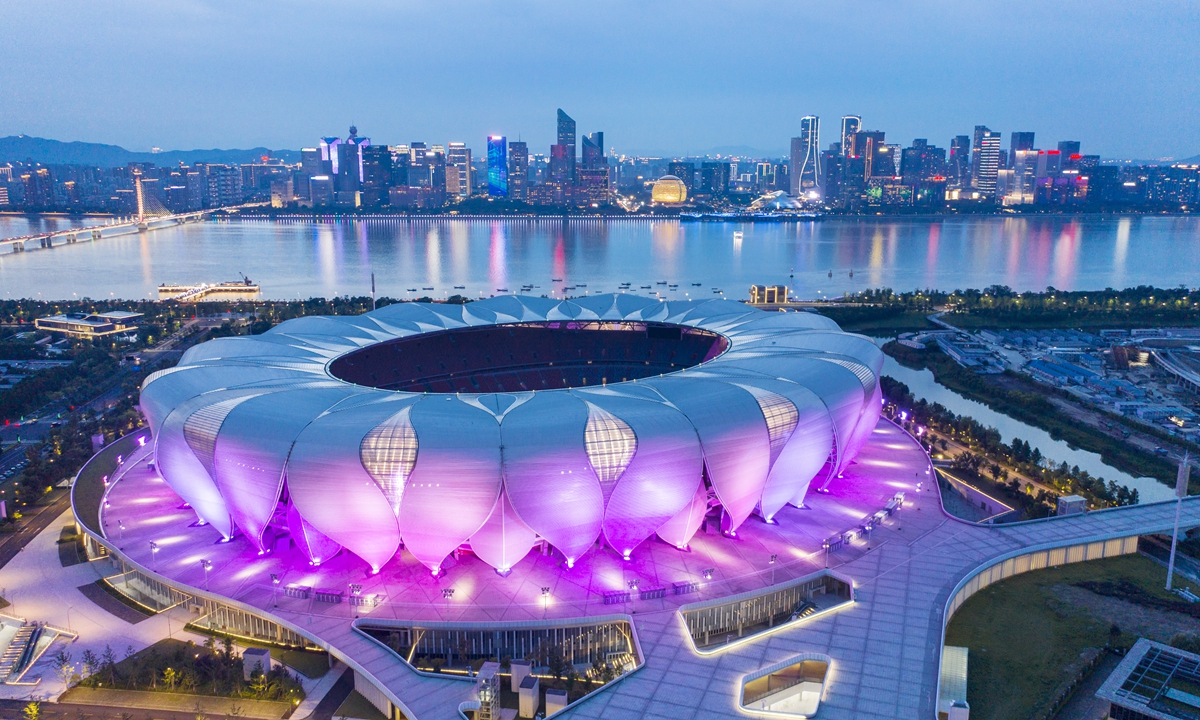After being postponed due to COVID, the 2022 Asian Games, set in Hangzhou, officially began on Saturday. This multi-sport tournament taking place on the world’s largest continent, as measured by both geographic area and population, will be bigger than the Paris 2024 Olympics in terms of athletes which number over 12,000.
Despite the scope of the Asian Games, few Westerners will even be aware this event is taking place, and fewer will have heard of the hosting city Hangzhou – let alone know how to pronounce it. This is not because the Asian games, which offers qualification to the Olympics, don’t offer a sporting feast – they do.
India and Pakistan will face each other in the non-Olympic sport of cricket, in track and field world champions like Neeraj Chopra of India and Kitaguchi Haruka of Japan will compete in the javelin, and in swimming South Korea’s Hwang Sun-woo is set to battle against China’s Pan Zhanle. Then there are a host of sports such as gymnastics, ping pong and badminton that Asia excels at.
The Asian Games deserves extra attention as they reflect rising Asian culture – they are not just a copy of Western sports transposed onto Asia. You can expand your mind by witnessing the Indian contact sport of kabaddi, the Southeast Asian sport of sepak takraw (kick volleyball), and the martial art.
Reflecting Asian values, the Asian Games also include mind sports such as bridge, chess, and Xiangqi – the Asian version of chess played on the streets in China and Vietnam. Personally, I find this version more engaging as games, though being just as complex as chess, are quicker due to the rapid opening phase and decisive endgame. It is a game that deserves to be more popular globally.
The Asian Games presents the West with an opportunity to learn from Asia. However, the Western press seems to be wilfully ignoring this giant sporting event and even casting the Asian games in a negative light. If you google the games, one of the first news pieces that will come up is an incredulous propaganda piece describing the “glum mood” of the Chinese people toward the Asian Games, which is portrayed as a vanity project wasting resources while the Chinese economy “splutters”!
This is from the same playbook of the lead-up to the Beijing 2008 Olympics which were thoroughly politicized to keep Westerners ignorant of China’s successes. However, I lived in Beijing between 2007 and 2009 and I witnessed the building of the infrastructure up to the games. Yes, it was grand and impressive but in contrast to the poverty alleviation I witnessed, this infrastructure and spending was a drop in the ocean. The very reason China could put on such an impressive 2008 Olympic Games was because it had an immense economic foundation to back up the “glitz.”
From 2008 to 2023 China has made leaps and bounds. Its GDP per capita has almost quadrupled and IMF figures show its real GDP growth for 2023 is around 5.2 percent, much higher than the US at 1.6 percent or the UK at -0.3 percent.
As an example of China’s achievements, we would do well to look at the hosting city of Hangzhou, which I have visited on three occasions. With a population of nearly 12 million, renowned architecture, numerous museums, and set around the splendid natural attraction of the West Lake it warrants greater attention from the world, which these games will deservedly give to this city. When I last visited, in 2012, the city’s subway was not yet in operation. Today, the subway system stretches out over 500 kilometers.
Hangzhou’s success is not a one-off vanity project that has been carefully crafted as a facade for the world to see. Hangzhou’s development pattern is typical throughout China. This is evidenced by it only having the sixth-longest subway system in China – behind Shanghai, Beijing, Guangzhou, Shenzhen and Chengdu.
The build-up to the Hangzhou Asian Games has been spectacular – the impressive drone show which took place 200 days before the start of the games is a sample of what is to come. Beyond the glitz, sports parks have sprung up around the city and infrastructure has been improved to ensure easy access to facilities – I expect that this event, taking long term planning into account, will ultimately enrich the city.
The Asian Games were founded after World War II, when Asian colonies gained their independence from the West. Today, in Hangzhou, they act as an opportunity for the West to drop its negative colonial mindset and learn about Asian culture and economic development from the perspective of equals.
The author is an independent international relations analyst who focuses on China’s socialist development and global inequality. opinion@globaltimes.com.cn













